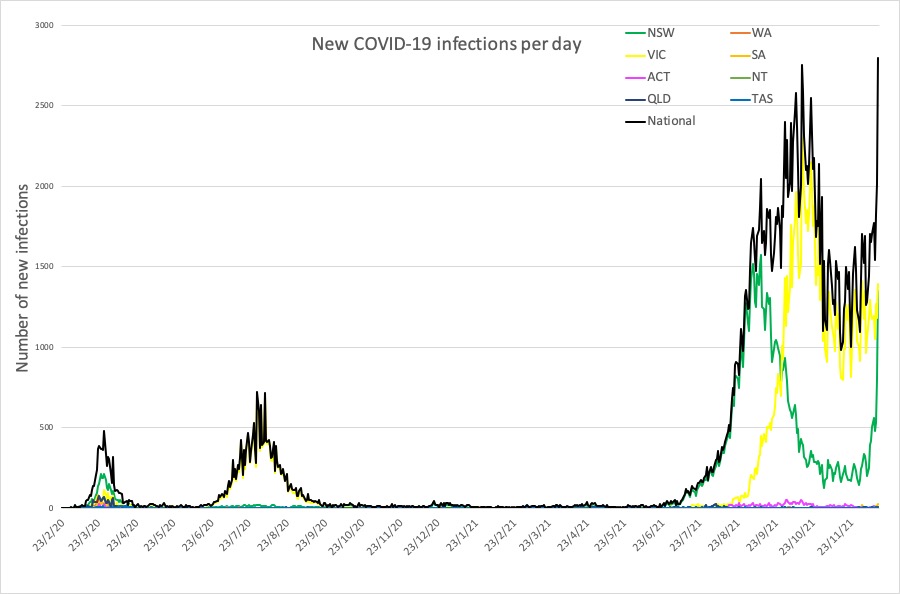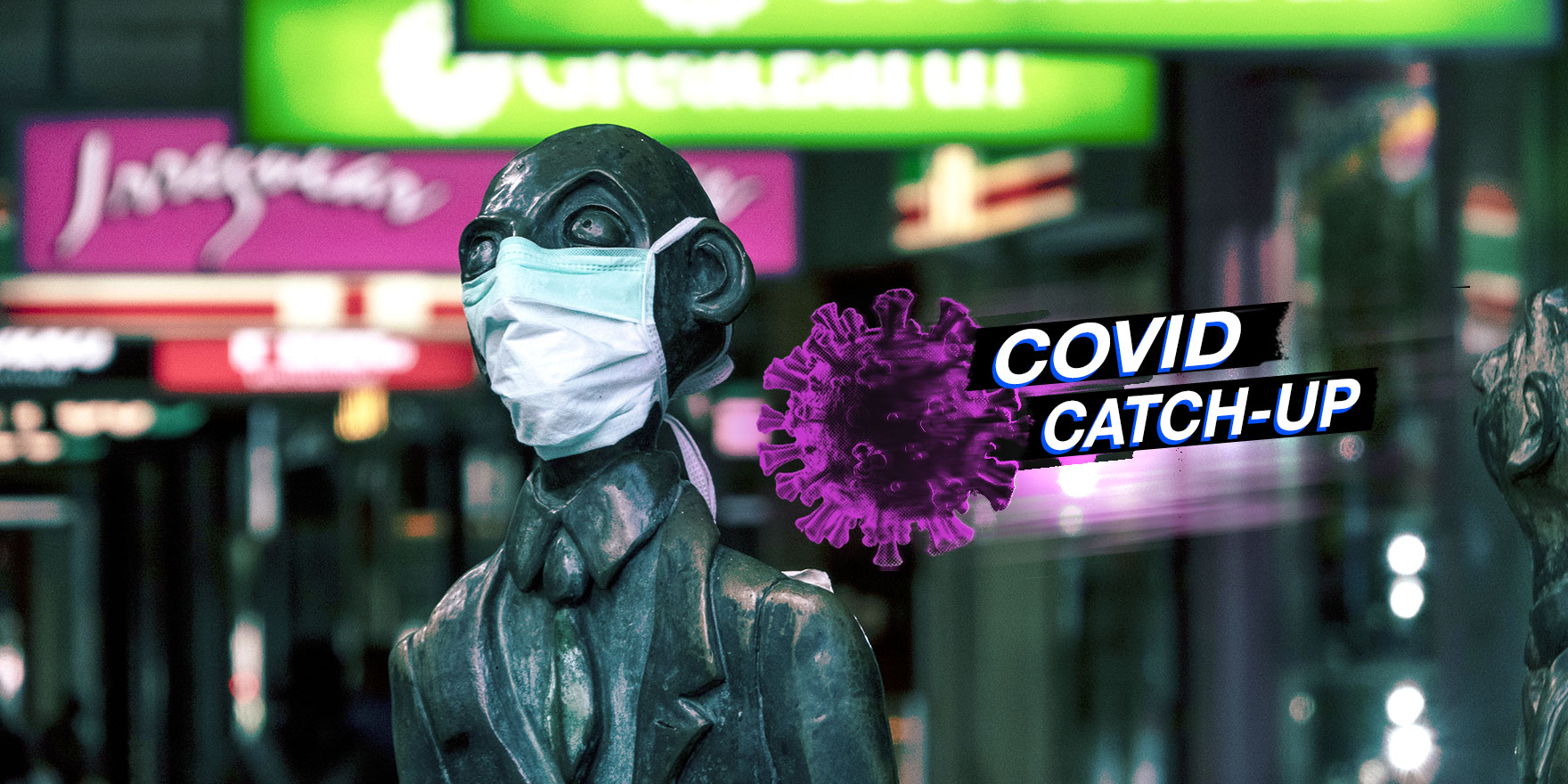And the risk of myocarditis significantly higher with SARS-CoV-2 than with covid vaccines.
Welcome to The Medical Republic’s Covid Catch-Up.
It’s the latest covid-19 news in one convenient post. Email bianca@biancanogrady.com with tips, comments or suggestions.
16 December
- NSW infections hit record high as health authorities pull back on contact tracing.
- SARS-CoV-2 infection is associated with significantly more myocarditis cases than vaccination is.
- No Omicron fatalities reported in Europe but authorities urge caution.
- Around 40% of SARS-CoV-2-positive people asymptomatic at time of testing.
- Latest on the covid vaccine rollout.
- Latest covid infection numbers from around Australia.
New South Wales is moving to ‘light touch’ contact tracing, where only household members and partners of infected individuals will be considered close contacts and required to isolate and get tested.
“We know the greatest risk that people will have will be household contacts,” NSW Chief Health Officer Dr Kerry Chant said at a press conference yesterday.
All close contacts – regardless of vaccination status – are required to self-isolate for seven days, with PCR tests as soon as they are made aware of their exposure, and again on day 6, followed by avoiding high-risk settings for a further week until another PCR test on day 12.
The announcement comes as NSW went ahead with removing mask requirements and QR-code check-ins for many indoor public spaces, and just before the state broke its pandemic record for the highest number of new infections in a single day.
At the press conference, NSW Premier Dominic Perrottet chastised journalists for focusing on the number of new infections, saying the focus should be on hospitalisations and ICU admissions, which were not going up at the same rate as infections.
Perrottet, Health Minister Brad Hazzard and Chief Health Officer Dr Kerry Chant sweated at the outdoor event, and not just from the blazing sun.
The question of masking put Dr Chant into an uncomfortable position, caught between the political edict that masks are no longer required indoors in most hospitality and retail settings from yesterday, and her own carefully-worded plea that NSW residents continue to wear masks in indoor public settings.
Infection with SARS-CoV-2 was associated with an extra 40 cases of myocarditis per million infections, while vaccination with the Moderna vaccine was only linked to an additional six myocarditis events per million vaccinated.
A paper published in Nature Medicine used individually-linked patient data on immunisation and hospital admissions for myocarditis, pericarditis or cardiac arrhythmias in more than 38 million adults vaccinated with at least one dose of either the AstraZeneca, Pfizer or Moderna vaccines, 2.3 million of whom had also tested positive for covid before their vaccination.
In the 1-7 days following a first dose of the Moderna vaccine, the study saw an eight-times higher risk of myocarditis, while the first seven days after a positive SARS-CoV-2 test were associated with a 21-times higher risk of myocarditis.
However in the 28 days following either a second dose of Moderna or a SARS-CoV-2 positive test, the risk of myocarditis was increased by a similar amount – around nine times higher than baseline risk.
The study found no association between any of the vaccines and an increased risk of pericarditis, but saw a nearly five-fold higher risk of hospital admission or death from pericarditis in the 1-7 days following a SARS-CoV-2 positive test.
The authors commented that while most of the vaccine-associated myocarditis events were mild and self-limiting, “the lifetime risk of morbidity and mortality following SARS-CoV-2 infection is substantial.”
Among the nearly 2700 cases of Omicron infection reported in the European Union since the variant emerged, none have been fatal and most cases appear to be mild or asymptomatic, according to an update from the European Centre for Disease Prevention and Control.
One fatality has been reported in the United Kingdom, but there is not yet information about whether that individual was vaccinated.
However the ECDPC has warned that the number of confirmed cases of Omicron is still too low to determine whether the variant has a different clinical presentation and severity than previous variants.
“Emergence of the Omicron variant of concern raises serious concerns due to preliminary reports of a significant growth advantage and potential immune escape compared to the Delta variant,” the report’s authors wrote.
Given the high rate of spread of the variant, the ECDPC said “strong and immediate reductions in contact rates” were needed to avoid cases spiking and potentially overwhelming healthcare systems, and recommended nations implement or strengthen non-pharmaceutical interventions to reduce transmission rates.
Around 40% of people who test positive for SARS-CoV-2 are asymptomatic at the time of testing, according to a meta-analysis published in JAMA Network Open.
Researchers analysed data from 77 studies – involving nearly 20,000 people – which reported the number of asymptomatic individuals among a tested and positive population.
This revealed that at the time of testing, 40% of those who tested positive had no symptoms. However there was variation in that rate, depending on the population being tested.
Among pregnant women, the rate of asymptomatic presentation at testing was 54%, nearly 53% in cruise or air travellers, around 47% in nursing home residents or staff, 30% among healthcare workers or hospital patients, and among close contacts it was nearly 27%.
More than 99% of Australians aged over 70 are double-vaccinated, and less than 7% of entire adult population is entirely unvaccinated, according to the latest data from the vaccine rollout:
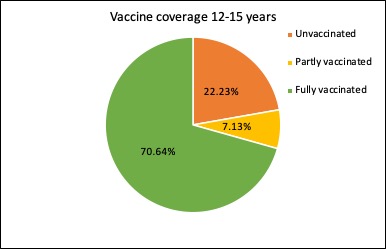
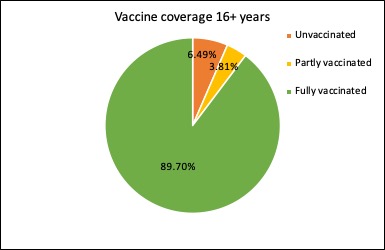
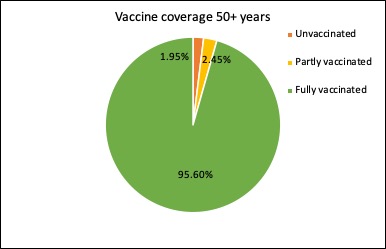
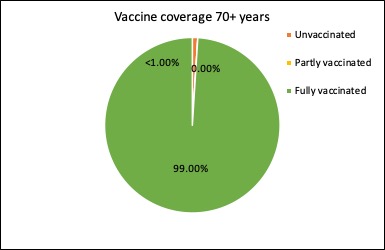
Here are the latest covid infection numbers from around Australia to 9pm Wednesday:
National – 235,562 with 2117 deaths
ACT – 2211 (7)
NSW – 88,595 (1347)
NT – 342 (14)
QLD – 2188 (8)
SA – 1057 (26)
TAS – 240 (0)
VIC – 139,804 (1395)
WA – 1125 (0)
